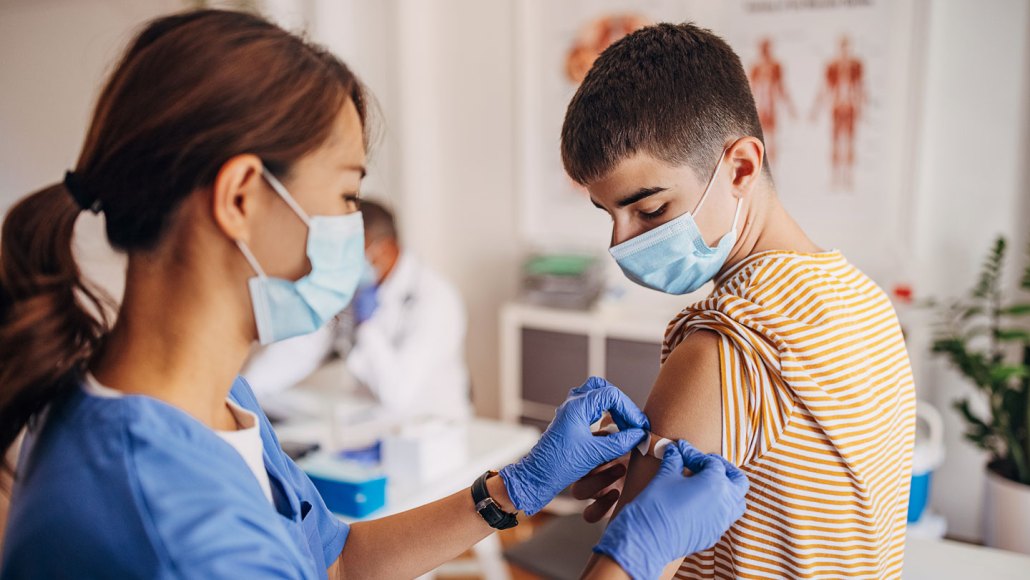FDA significantly limits access to COVID-19 vaccines
The agency is restricting new shots to people ages 65 and up or with underlying conditions

FDA is restricting access to new COVID-19 vaccines, limiting options for younger people who want to get the shots.
South_agency/Getty Images
The U.S. Food and Drug Administration is changing its policy on who should get COVID-19 shots, potentially limiting access to new vaccine formulations as they enter the market.
New and updated jabs will be approved only for people ages 65 and up, as well as those between 6 months and 64 years with at least one medical condition that heightens their risk for severe outcomes, according to the new FDA framework unveiled May 20 in the New England Journal of Medicine. Between 100 million and 200 million Americans would still be covered through this approval method, the framework authors say.
Moving forward, pharmaceutical companies can still apply for FDA approval for high-risk populations based on whether their vaccine elicits immunologic protection, such as infection-blocking antibodies, in people, Vinay Prasad, director of FDA’s Center for Biologics Evaluation and Research, said during a May 20 town hall about the framework.
But FDA officials want to see more data for otherwise healthy people. “We want to know more about what these products are doing, especially as we enter the seventh, eighth and ninth dose,” Prasad said. “All companies will be asked to conduct a randomized controlled trial testing their product … against a saline placebo” in people ages 50 to 64 after the vaccine gets licensed.
FDA implemented these conditions when it greenlit the new protein-based vaccine for COVID-19 from biotechnology company Novavax. That version gained FDA approval for certain people ages 12 and older on May 16 after a month-long delay in which the agency sought more safety data. It was ultimately approved after four clinical trials, two of which were placebo-controlled.
The new restrictions may also apply to updates to the two FDA-approved mRNA shots from Pfizer-BioNTech and Moderna.
Most individuals who are hospitalized with or die from COVID-19 are within FDA’s specified high-risk groups, says pediatric infectious diseases specialist Paul Offit. He adds that other countries also have targeted recommendations for boosters among high-risk populations.
But with the change in FDA’s approval criteria, “the thing that worries me about this is that [new vaccines] would be available for only those groups,” says Offit, who directs the Vaccine Education Center at the Children’s Hospital of Philadelphia and is a member of the FDA vaccine advisory committee.
For instance, a middle-aged person without one of the noted risk factors, such as asthma or diabetes, might simply want to lower their chances of getting long COVID. Under the new framework, that person might not have insurance coverage for a shot, which costs around $130 out of pocket.
Whether insurance companies will pay for the jab depends on the U.S. Centers for Disease Control and Prevention’s Advisory Committee on Immunization Practices, says biostatistician Susan Ellenberg of the University of Pennsylvania Perelman School of Medicine. That group makes recommendations once FDA approves a vaccine, and those in turn are used to make insurance decisions.
“What I would not like to see is a situation where people who don’t fall into that category couldn’t get it if they wanted it,” says Ellenberg, who monitored the safety of COVID-19 vaccines developed through Operation Warp Speed under the first Trump administration. “While the risk is quite low, it’s not zero.… People should be able to protect themselves.”
FDA’s additional request for placebo-controlled trials in people ages 50 to 64 is based on inconsistent lower age limits in other countries’ COVID-19 booster recommendations, Prasad said. Rather than simply measuring proxies for protection, such as antibodies, the agency wants to see that vaccines reduce the incidence of symptomatic COVID-19 by at least 30 percent. That means if 100 people get sick from COVID-19 in the placebo group, 70 or fewer people would become ill in the vaccine group.
“We have launched down this multiyear campaign of booster after booster after booster,” Prasad said. “We do not have gold-standard science to support this for average-risk [and] low-risk Americans.”
Ellenberg notes that health experts have mixed opinions on the benefits of boosters. But she worries that implementing placebo-controlled trials would slow vaccine availability to people ages 50 to 64 who would have otherwise benefitted from an updated shot.
Offit says additional clinical trials for approved vaccines are unethical because people who receive the placebo would lose out on established methods of protection. In the United States, SARS-CoV-2, the virus that causes COVID-19, still leads to about 300,000 hospitalizations and about 30,000 deaths every year, he says.
“There is no no-risk group.… Anybody can be seriously infected by this virus.”